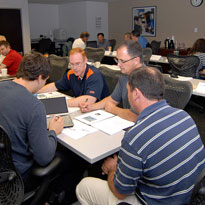GPRS
- Course:GPRS
- Course ID:GPRS Duration:3 days Where: Your Office (7+ Persons)
- Download Course Description (PDF)
Available as a private, customized course for your group at your offices or ours and in some cases as a WebLive(TM) class.
Course Outline
- Motivation, Background, and GPRS Services
- General perceptions of GPRS: True and false!
- Review of existing GSM network architecture and data services: Or Motivation for GPRS
- GPRS traffic models
- GPRS-offered data services
- GPRS Network Architecture
- GPRS mobile station modes and classes
- Packet Control Unit (PCU) and Channel Codec Unit (CCU)
- Serving GPRS Support Node (SGSN)
- Gateway GPRS Support Node (GGSN)
- Border Gateway (BG)
- Protocol stacks between the various GPRS network elements
- GPRS Air Interface Protocol Structures
- Mobility management and routing areas vis-à-vis location areas
- Mobile station states: Idle, Ready, Standby and associated transition and triggering mechanisms and parameters
- GPRS vis-à-vis GSM RF layer
- GPRS Medium Access Control (MAC) Sublayer
- GPRS Radio Link Control (RLC) Sublayer
- GPRS Logical Link Control (LLC) Layer
- GPRS Structures on the TDMA Air Interface
- New set of logical channels defined by GPRS
- The GPRS-Introduced 52-frame multiframe
- Mapping of GPRS logical channels to the physical channel(s)
- MAC operation and resource allocation schemes in GPRS
- RLC block structures and associated issues
- Retransmission strategies used in GPRS and protocol stalling issues
- Course Recap and Conclusion
- Strengths and weaknesses of GPRS
- Motivation for Enhanced GPRS (EGPRS), or EDGE
Course in a Nutshell
GPRS is the first technology to introduce packet switching to the world of mobile communications in a meaningful, large scale context. As such, it adds two major, equally important, elements, viz., (i) packet switching over the air interface and (ii) enhancements to the core to support packet switching on a GSM network.
Implementing packet switching over a highly unreliable and time varying channel, such as is typical in today’s wireless communications, is not an easy task. In this course, you will learn how GPRS tackles this problem and achieves a reasonable performance using packet switching over the air interface. You will also learn the new interfaces that were necessary in the fixed portion of the network to support an end-to-end packet switched service. We will not be shy about highlighting the shortcomings of GPRS, some of them quite serious. We will go on to learn which of these shortcomings can be mitigated (along with how that’s done) and which are unsolvable within the framework of GPRS.
Customize It!
Customize this course to your specific needs at little-to-no additional cost. We offer distinct versions tailored for:
- Network design and optimization engineers
- Equipment or application designers
- Less technical audiences such as managers, executives, business planners, sales and marketing specialists, and operations and support personnel.
You can also combine this 3-day GPRS course with its sequel, the 2-day EDGE course, for an integrated five-day presentation. Ask us about the ‘combo discount’.
Aimed At
Engineers experienced in GSM who wish to learn more about GPRS.
Prerequisites
- "Pete is a great instructor and makes his best attempt at making the material exciting. I wish this could have been offered at the classified level. He did a great job at creating a welcoming environment. Most of the topics presented were specifically needed. Technical contents directly related to my daily job ... specific details about network cell configuration and detailed explanations of call setup and handovers. I now have greater understanding of GSM. Great Training!" - US Naval Surface Warfare Center
- "Good overview with some necessary depth. Great instructor with a lot of experience." - MM, Manager, US Department of the Navy

